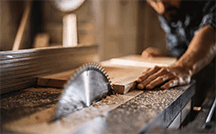According to a
recent survey of 1,000 homeowners using Houzz, more than
half who were in the process of renovating their home have
continued to pursue their renovations when the coronavirus
pandemic was declared in mid-March. While 47 percent of
homeowners put their renovation or design projects on hold,
40 percent planned to resume the project at a future date.
Despite fears from the industry channel, only 1 percent of
people surveyed actually cancelled a project already
underway.
 With
more people working from home, it’s no surprise that home
offices and master bedrooms are the projects least likely to
be paused. Similarly, as people have been eager to get
outside from sheltering-in-place, three in five homeowners
continued work on their outdoor projects. More than 50
percent of homeowners continued with even more complex
projects like kitchen and master bathroom remodels. With
more people working from home, it’s no surprise that home
offices and master bedrooms are the projects least likely to
be paused. Similarly, as people have been eager to get
outside from sheltering-in-place, three in five homeowners
continued work on their outdoor projects. More than 50
percent of homeowners continued with even more complex
projects like kitchen and master bathroom remodels.
While many homeowners have been reluctant to invite home
renovation professionals inside their homes – that trend
appears to be reversing and remodeling projects are
beginning to gain significant momentum once again.
Homes…they are a changin’
What about homeowners who weren’t pursuing renovations pre-COVID?
Well, nine in 10 said they are now considering major home
remodeling and design projects. And nearly four in five are
thinking about changes that would help them enjoy their home
more. Outdoor, bathroom and kitchen projects topped
homeowner wish lists… with desired changes including new
decor, better lighting and an improved layout.
The America at Home Study, conducted in late April,
similarly reports that homeowners are primed and ready to
modify their homes. While the majority of homeowners may
have deemed their existing spaces to be sufficient prior to
COVID-19, many report that they are no longer satisfied with
these spaces. Open concept floor plans – which had been
growing in popularity pre-pandemic – are suddenly not as
welcome when a single room has been expected to function as
a home office, a classroom and an entertaining area.
‘Safer, smarter and more flexible’ rule the day
In the America at Home Study, most homeowners surveyed are
looking to make changes in the areas of hygiene, wellness
and adaptability/flexibility of space.
More than 50 percent of those surveyed say they want
germ-resistant countertops and flooring, increased
tech/energy efficiency and additional storage for pantry
items. A similar percentage desire
touch-free faucets and appliances, smart toilets along
with kitchens better equipped for home meal preparation.
More than 30 percent of respondents say they want touchless
door entries and home offices that can accommodate more than
one person… as well as spaces with flexible walls. Building
products manufacturers are already responding to the desire
for safer surfaces. For example, NanaWall will begin
offering
copper handles as a hardware option for all of its
opening glass wall systems.Story
continues below ↓
advertisement
| your ad here
A common theme
seems to be emerging. Homeowners are ready for change. And
they’re willing to invest in remodeling.
So, how can building product brands make the most of this
increased enthusiasm for home projects? Following are proven
ways to make sure your brand gets noticed:
Make it easy.
Amidst the pandemic, more homeowners have been turning to
online tools for shopping, remote communication, contract
approvals and invoicing as well as fintech financing
resources to help move along their projects.
If your brand currently offers online tools and resources,
make certain to highlight those user experiences with
convenient links from your website, social media pages and
in emails to customers and prospects. Consider investing in
an online visualizer tool that enables consumers,
contractors and influencers to see different configurations
of your products in a variety of interior and exterior
settings. Better yet, provide resources for potential
audiences to upload their own images – and allow them to
customize their existing environments virtually – with your
products. These types of technology are considerably more
accessible today than ever before.
A number of building product brands utilize estimating
software. Provide access to one of these tools – or offer an
in-house version – making sure to promote the benefit to
those who may be looking for ways to simplify the
decision-making process.
Don’t forget to re-familiarize your dealers and distributors
with the resources your brand offers including product
collateral, videos, product training, comparison guides,
reviews and white paper research. Begin by taking the time
to ask your sales team what other resources have they found
to be helpful in sharing the value of your brand’s offerings
with their customers.
Get social.
Whether it’s researching the latest home decor trends, or
perusing social platforms… audiences are looking for
information they can rely upon. And a sense of connection.
It’s no coincidence that Facebook, Instagram, LinkedIn,
Snapchat, Twitter and Reddit have all reported a significant
growth in engagement since March.
For optimal impact, develop a strategy to
boost your social media engagement in a way that helps
drive new sales. First things first – make sure you know the
profiles of your best followers – then, focus your efforts
on the platforms that reach your ideal target audiences.
Facebook. Facebook has 2.2 billion users, and 68
percent of adults log on at least once each day. Eighty
percent of Americans aged 18-49 use Facebook, and 41 percent
of those 65 years and older are active on the platform.
Instagram. Like most social media platforms,
Instagram is dominated by
millennials. However, 40 percent of 30-49-year-old
Americans regularly use Instagram. And the design community
is among the most important and has exhibited a voracious
appetite for this visual-dominated resource.
Twitter. 18-24 year olds being are the most popular
demographic and represent the next generation of
emerging homeowners. Roughly 45 percent of that age
group actively uses the platform, and use declines as age
increases.
Next, make sure you are tapping into social listening tools
and being mindful of what’s taking place on your social
media sites. Actively engage with your audience, making sure
to respond quickly to any comments or questions. Being
available to your customers will create a sense of trust and
reassurance. Did they invest recently some time with one of
your products? Drive an automated marketing reminder
campaign back to them… before they find a competitor’s
offerings more engaging.
You might also want to pay to “boost” your more highly
differentiated-product pages on selected social media
platforms to a targeted audience(s). For instance, you can
boost your Facebook page to reach 30-40-year-old women
located in Chicago – who have an interest in home
improvement. A single boost can increase followers
significantly. How to begin? Consider investing $50-100
every month simply to boost your page, until you reach a
determined target number of followers.
Facebook Ads are another effective way to reach more
potential customers.
Want to learn how to elevate your brand and position it for
continued success in the growing post-pandemic economy? Send
us an email at
skleber@kleberandassociates.com.
###
Steven
(Steve) Kleber is founder of Kleber & Associates (K&A), a
full-service marketing and communications agency founded in
1987 with a focus on the home and building channel. |
